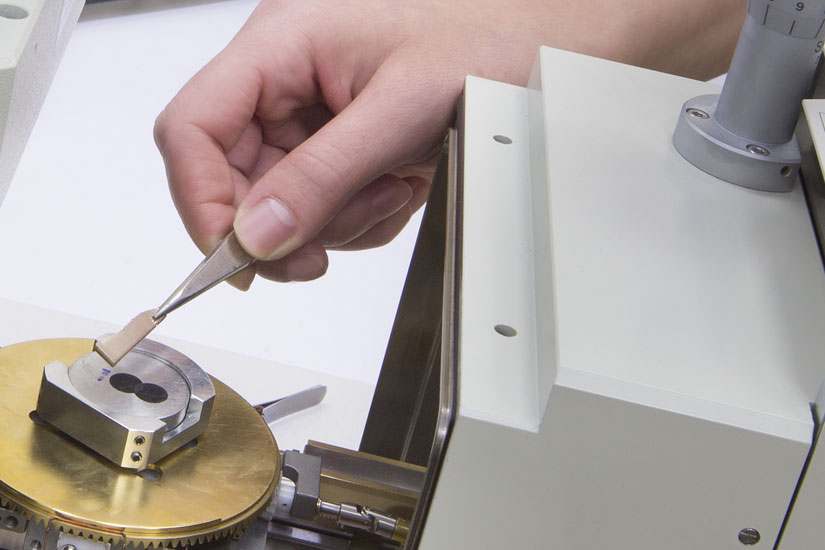
Manufacturing Technologies
NOBILIS METALS provides leading edge technologies coupled with proprietary metal forming techniques and processes to provide superior “In Service Life” to our high performance precious metal products.
Our high security manufacturing facilities includes over 400,000 square feet of unmatched state-of-the-art precious metal manufacturing technology.
NOBILIS METALS is ISO 9001:2008 and ISO 14001:2004 Certified
Technical Expertise and High Volume Capacity
- Over 140 years of precious metals manufacturing
- Support for all development stages:
Materials Selection • Custom Design Engineering • Prototype • Manufacturing Design • Volume Manufacturing - Complete process control from melting and metal forming to precision machining

Advanced manufacturing equipment including:
• Vacuum Melting
• Vacuum Static Casting
• High Temperature FusionForged® Extrusion
• Vertical and horizontal drawing using both fixed and floating plugs.
• Deep Drawing
• Rolling
• Stamping
• Specialty Forming
• EDM Cutting
• Fully Automated 5 Axis CNC Machining
• Dual spindle CNC, High Production Lathes
• Annealing and Specialty Heat Treatment
• Fully Equipped Analytical and Chemical Analysis Laboratories
- Continuous investment in new technologies and equipment
- JIT delivery
- Dedicated professional sales and service team to provide rapid response
Technical Expertise and Support
The experience of our technical staff encompasses a wide variety of disciplines that include metallurgy, materials science, physics, chemistry, mechanical engineering, chemical engineering, process control, and automation. Our laboratories provide:
Analytical and Chemical Analysis
Equipped to perform full chemical analysis of pure metals and alloys. Especially geared towards precise analysis of precious metals and industrial alloys, finished products, clean scrap, grindings, and sweeps.
Materials Characterization Analysis
Uniquely qualified to address metallurgical issues related to modern precious metal usage and applications in electrical/electronics, automotive, medical, solar energy, and other high-tech industries.
Feed Stock Dimensions
Depending on the materials selected and the product form NOBILIS METALS Clad Products will fall within the dimensional ranges shown below.
Tubing
The dimensional range of tubing depend to a degree on the outside diameter to wall ratio as well as the material or alloy selected. NOBILIS METALS makes both seamless and seamed tubing and can accommodate:
Outside Diameters from .060" (1.52 mm) to 1.280" (32.5 mm)
Wall thicknesses from 0027" (.069 mm) to .150" (3.81 mm)
Tube Length: Maximum tube lengths are of course determined by the OD and wall dimensions of the tube. Tube can be cut to length as required.
Rod & Wire
Minimum Diameter: .003" (076 mm)
Maximum Diameter: 1.90" (48.26mm)
Straight Lengths for diameters from .025" (.635 mm) to .377" (9.58 mm) / 1 to 12' length.
Coils / Spools for diameters from .022" (.559 mm) to .350" (8.89 mm)
Weight per spool 50 to 300 troy ounces depending on coil, spool or reel size.
NOBILIS METALS will customize wire packaging as required
Flat Stock
Sheet, Strip, Foil, Ribbon
Thickness: .001" (.0254 mm) to .100" (2.54 mm)
Note: Thicker material can be produced if a high grade finish is not required.
Widths: Maximum Width is 12" (304.8 mm)
Minimum width is determined by thickness and material selected.
Call for details.
Straight Lengths: Maximum of 8'
Coiled lengths: 300 Toz Maximum
Tolerance: Dimensional tolerances will vary depending on the thickness and width required.
Applications
Clads for Electrical Applications
• Test Probes - Circuit Boards
• Electrical Contacts
• Electrodes
Clads as Contact Alloys
A simple example of an electrical contact would be a switch which has two pieces of metal called contacts that touch to make a circuit, and separate to break the circuit. The contact material is chosen for its resistance to corrosion, because most metals form insulating oxides that would prevent the switch from working.
Electrical Contacts are often clad with precious metals or manufactured from solid precious metal alloys. Contact materials are also chosen on the basis of electrical conductivity, hardness (resistance to abrasive wear), mechanical strength, low cost and low toxicity.
Clads as Electrodes
An electrode is an electrical conductor used to make contact with a nonmetallic part of a circuit (e.g. a semiconductor, an electrolyte or a vacuum). Electrodes can be made from Gold, Silver, Platinum and combination alloys, depending on the application and required characteristics appropriate to the application
NOBILIS METALS email updates
Contact Information
- NOBILIS METALS
49 Pearl Street
Attleboro, MA 02703
1 888 NOBILIS (662-4547)
info@nobilismetals.com
USA • Asia • Europe
- The Engineered Materials Business of LeachGarner
- www.LeachGarner.com
-
ISO Certified
A Berkshire Hathaway Company
NOBILIS METALS All Rights Reserved 2021

